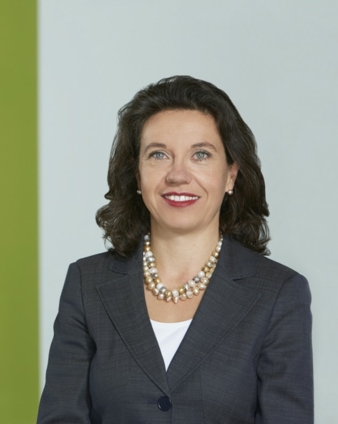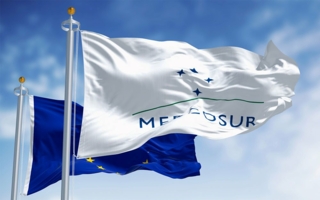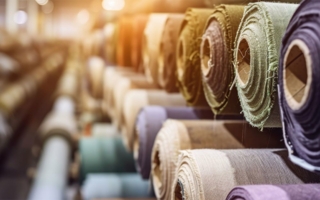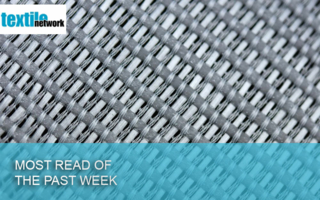27/10/2015 — auf Deutsch lesen
The Olympic Games for textile machinery makers
Scheduled to take place from 12 to 19 November in Milan, ITMA 2015 is now poised in the starting blocks as the sector looks on with bated breath. The motto of this major international trade fair – “Master the art of sustainable innovation“ – is on everyones lips. textile network spoke to Regina Brückner, Chairperson of the VDMA German Textile Machinery Association, about sustainability and the expectations of the VDMAs members for ITMA.
Regina Brückner: Basically, the members of the VDMA are going to this leading fair to persuade customers from all over the world that German technology in textile production can bring about substantial savings in the consumption of energy, water and raw materials, providing firms with a genuine competitive edge.
Regina Brückner: Energy efficiency is a central aspect of sustainability. In the run-up to Milan, the VDMA and our member companies have been breathing life into ITMA’s motto and, rather than making theoretical observations, we have been shedding light on practical examples of sustainable technologies. The R&D efforts of German suppliers in the realm of energy efficiency across the entire production process have indeed borne fruit: Today, German textile machines that make T-shirts or textile advertising banners consume around 30 per cent less energy than ten years ago. This is a real-life example of sustainability.
Regina Brückner: The high international standing of German engineering in the field of textile machinery mainly stems from its leading position in delivering technology and quality. Discerning customers expect the highest product quality to go hand in hand with maximum productivity. In addition, our companies complement the efficiency of their products with an excellent range of services. All this is made possible by continuous efforts in Research and Development. You can only deliver superb machinery if you have superb engineers that have the ability to translate research results and customer needs into marketable products. Just looking at the field I’m familiar with, I would say that machines for non-wovens and technical textiles are outstanding examples of this.
Regina Brückner: At Germany’s universities, textile machine engineering is having to compete with a whole host of other technical disciplines. The Walter Reiner Foundation organised within the VDMA textile machinery association creates incentives, such as grants, subsidised excursions to member companies and ITMA as well as various advancement and creativity prizes. The objective is to arouse student interest in textile machine engineering. Another challenge lies in tapping new markets or in regaining a foothold in markets that have been closed to global trade for a long time. The VDMA plays an active role here by organising market exploration trips and symposia for its member companies. Last autumn, for example, we offered a market exploration trip to Ethiopia, followed by a symposium in Iran in the spring.
Regina Brückner: In 2014, Germany produced EUR 3.6bn worth of textile machinery, EUR 3bn of which was exported. Our biggest markets were China, Turkey, India and the USA. Order levels for the first half of 2015 have been described as good by the majority of companies. Firms are keen to step up investments in technical textiles, with Germany and other European markets developing well in the field of functional textiles. New projects are in the offing in the US, India has been developing well over the past two consecutive years, order levels from Pakistan are sizeable and Indonesia is on the up and up. In Bangladesh, order levels are relatively good, whilst business in North Africa is on the increase. By contrast, business with Turkey is cooling off a little and demand from South America is relatively flat. In China many textiles manufacturers are struggling with spare capacities. Market players are witnessing a drastic reduction in new projects, as many Chinese customers are looking to invest abroad, e.g. in Uzbekistan.
Regina Brückner: This year, the main focus is on asserting our market leadership in technology and quality at ITMA in Milan; we are concentrating on this area in the board room as well. We are also looking to reinforce ITMA’s position as a leading industry event. We see this as an important task in our role as an association and member of Cematex. Fostering European and international contacts is another important part of our work. Just a few months ago, for example, we welcomed Uzbekistan’s Textiles Minister Ilkhoom Khaydarov as our guest. During our meeting we signed an agreement pledging to engage in closer cooperation, and we are planning a range of activities in the field of further training.
Regina Brückner: A moving moment was the inauguration of the VDMA Conference in Teheran last April and the extremely warm reception from the 1,100 Iranian attendees. The timing was perfect, bearing in mind that a deal was struck in the nuclear talks in Vienna just a few weeks later, paving the way for the scaling back of sanctions and the revival of trade.
I try not to get angry but new regulations from Berlin such as new rules on temporary employment and works contracts, the pension age of 63 and red tape for companies are not always positive. Politics should be giving companies sufficient breathing space and instead be investing more time and energy in providing consistent and high-quality education and training. Constant changes to the education system, which also varies from federal state to federal state, are not always useful.
But we as mechanical engineers are pragmatic people, who rarely moan but focus on what’s feasible and, where possible, we try to shape things the way we want them.
Regina Brückner: I hope that the principles of global free trade continue to be upheld. More recently, we have been seeing a trend among certain countries to give their domestic industries competitive advantages by closing some of the doors to their markets. A global race to curb trade is the last thing we need. Free trade promotes the international division of labour, which benefits everyone. We, here in Germany, do not live on an island but are part of a global economy – which admittedly has some downsides but also offers plenty of opportunities. A frank debate about this in politics, the media and society as a whole would be important for everyone concerned.
When it comes to our members and our customers, we would like to identify new fields of application for textiles. Textiles are replacing many materials in the automotive sector, in aviation and other industries – which gives us an abundance of opportunities whilst lending textiles a new and highly innovative image.
Ms Brückner, many thanks for the interview.
The questions were asked by Iris Schlomski on behalf of textile network.




